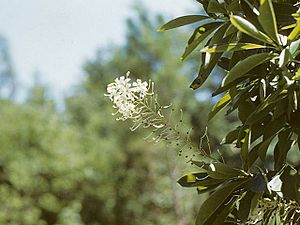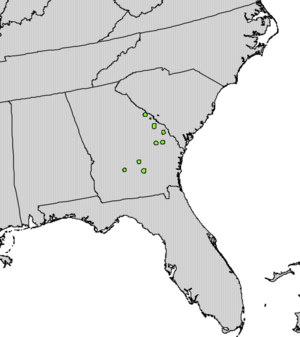Georgia plume facts for kids
Quick facts for kids Georgia plume |
|
|---|---|
 |
|
| Conservation status | |
| Scientific classification |
|
| Kingdom: | Plantae |
| Clade: | Tracheophytes |
| Clade: | Angiosperms |
| Clade: | Eudicots |
| Clade: | Asterids |
| Order: | Ericales |
| Family: | Ericaceae |
| Genus: | Elliottia |
| Species: |
E. racemosa
|
| Binomial name | |
| Elliottia racemosa Muhl. ex Elliot
|
|
 |
|
| Script error: The function "autoWithCaption" does not exist. | |
Script error: No such module "Check for conflicting parameters".
Elliottia racemosa, also known as the Georgia plume or summer plume, is a special plant. It belongs to the Ericaceae family, which includes plants like blueberries and rhododendrons. This plant is found only in the U.S. state of Georgia. This means it is endemic to Georgia, like a unique treasure found nowhere else in the world!
Contents
Discovering the Georgia Plume
The Georgia plume is a very rare plant. It can grow as a shrub (a bushy plant) or sometimes even a small tree.
How It Was Found
A famous explorer named William Bartram first saw and drew this plant in 1775. Later, in 1808, a South Carolina botanist named Stephen Elliott rediscovered it. A botanist is a scientist who studies plants. Stephen Elliott then officially described the plant, giving it its scientific name.
What the Georgia Plume Looks Like
The leaves of the Georgia plume are usually about three to four inches long. They are also one to two inches wide. When it blooms, the plant has beautiful white flowers. Each flower has four petals. After the flowers, the plant makes a dry fruit.
Where the Georgia Plume Grows
The Georgia plume likes different kinds of places. You can find it near moist stream banks, which are the edges of rivers and creeks. It also grows on dry ridges, which are higher, drier areas. It usually prefers sandy soil. This plant is found in scattered spots across eastern and southern Georgia.
Why the Georgia Plume Is Special
The Georgia plume is listed as a threatened species. This means there are not many of these plants left. It is important to protect them so they do not disappear. Scientists and conservationists work to make sure this unique Georgia plant can continue to grow and thrive.
 | Dorothy Vaughan |
 | Charles Henry Turner |
 | Hildrus Poindexter |
 | Henry Cecil McBay |


